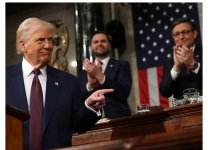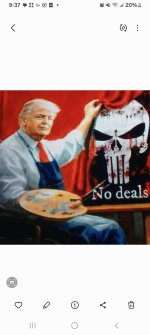Constitutionally, Congress has authority over tariffs as over all other taxes. According to this article, Congress has delegated authority to the president to impose tariffs in certain circumstances -- the only one of which might apply is this:
International Emergency Economic Powers Act of 1977[1] (IEEPA). IEEPA empowers the president to address any “unusual and extraordinary” external threats to the national security, foreign policy, or economy of the U.S. upon declaration of a national emergency under the National Emergencies Act[2] (NEA). On making such a declaration, the president may impose sanctions, freeze assets, and prohibit or regulate the importation of any property in which a foreign country or foreign national has any interest.
Presidents commonly use IEEPA to impose export controls, embargoes, and sanctions on countries, and individuals, as well as to block imports from designated countries and acquisitions made by designated foreign nationals. Neither IEEPA nor NEA define an “unusual and extraordinary threat” to U.S. “national security, foreign policy, or economy” or a “national emergency,” leaving the president wide discretion to both define the national emergency and design actions necessary to address circumstances giving rise to the national emergency.
To date, no president has imposed tariffs invoking the authority of IEEPA. In 2019, then-President Trump threatened to invoke IEEPA to impose tariffs on Mexican imports to deal with illegal border crossings. The threat was later rescinded when the Mexican government pledged to cooperate to stem illegal border crossings.
Calling the present border situation an "unusual and extraordinary" threat to the national security, foreign policy, or economy of the U.S. is a real stretch!
International Emergency Economic Powers Act of 1977[1] (IEEPA). IEEPA empowers the president to address any “unusual and extraordinary” external threats to the national security, foreign policy, or economy of the U.S. upon declaration of a national emergency under the National Emergencies Act[2] (NEA). On making such a declaration, the president may impose sanctions, freeze assets, and prohibit or regulate the importation of any property in which a foreign country or foreign national has any interest.
Presidents commonly use IEEPA to impose export controls, embargoes, and sanctions on countries, and individuals, as well as to block imports from designated countries and acquisitions made by designated foreign nationals. Neither IEEPA nor NEA define an “unusual and extraordinary threat” to U.S. “national security, foreign policy, or economy” or a “national emergency,” leaving the president wide discretion to both define the national emergency and design actions necessary to address circumstances giving rise to the national emergency.
To date, no president has imposed tariffs invoking the authority of IEEPA. In 2019, then-President Trump threatened to invoke IEEPA to impose tariffs on Mexican imports to deal with illegal border crossings. The threat was later rescinded when the Mexican government pledged to cooperate to stem illegal border crossings.
Calling the present border situation an "unusual and extraordinary" threat to the national security, foreign policy, or economy of the U.S. is a real stretch!

